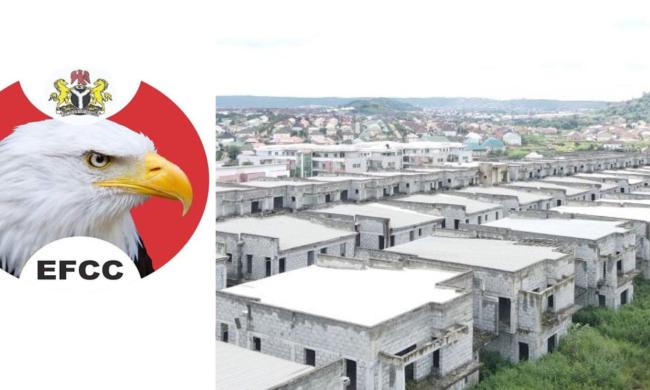
A prominent legal practitioner, Ifeanyi Ejiofor Esq., has harshly criticized the Economic and Financial Crimes Commission (EFCC) for its decision to withhold the identities of individuals linked to the ownership of 753 recovered duplexes in Abuja. Ejiofor described the EFCC’s explanation as an outright “insult to Nigerians’ intelligence.”
In a statement on Tuesday, the EFCC, through its Head of Media and Publicity, Dele Oyewale, dismissed calls to reveal the culprits behind the confiscated estate. Oyewale took aim at critics, including human rights activist Omoyele Sowore, labeling his demand as “uncharitable.” According to the EFCC, the legal action to recover the estate was in compliance with Section 17 of the Advance Fee Fraud Act, a civil process that targets property rather than individuals.
“The Act permits forfeiture proceedings against unclaimed properties that are not associated with any legal entity. This is precisely what the Commission applied in the case of the Abuja Estate,” Oyewale stated, arguing that the absence of personal ownership justified their approach.
However, Ejiofor, who serves as one of the principal legal representatives of the Indigenous People of Biafra (IPOB), strongly opposed the EFCC’s stance in a statement issued on Wednesday. He condemned the justification as a feeble attempt to obscure accountability.
“The EFCC’s reasoning is absurd and offensive to Nigerians. If they decided not to disclose the identities of those behind the properties, silence would have been a better approach than this weak and unprofessional excuse. Hiding under Section 17 of the Advance Fee Fraud Act to defend their failure reeks of deliberate obfuscation,” Ejiofor said.
He further criticized the EFCC for targeting young Nigerians while failing to trace ownership of such a significant project.
“This is the same EFCC that relentlessly pursues unemployed youths, blocking their legitimate earnings with sophisticated tools. Yet, they now claim ignorance when tasked with unmasking the real owners of 753 duplexes in a prime Abuja location. This excuse is an affront to the intelligence of over 200 million Nigerians,” Ejiofor argued.
The lawyer raised pertinent questions, asking how such a massive project could lack documentation of ownership. “Who approved the building plans? Who allocated the land through the Federal Capital Territory Administration (FCTA)? What about certifications from AGIS or contracts with developers? Every stage of this project should have a paper trail,” he noted.
Ejiofor accused the EFCC of shielding corrupt elites and called on the agency to be transparent. “Instead of hiding behind evasive rhetoric, the EFCC should admit that influential, corrupt figures are being protected. Nigerians deserve accountability, not poorly crafted excuses,” he concluded.
For more updates, join our WhatsApp channel: Chronicles Reporters.